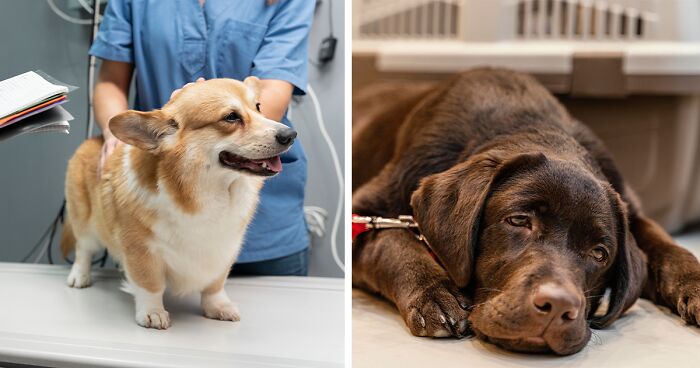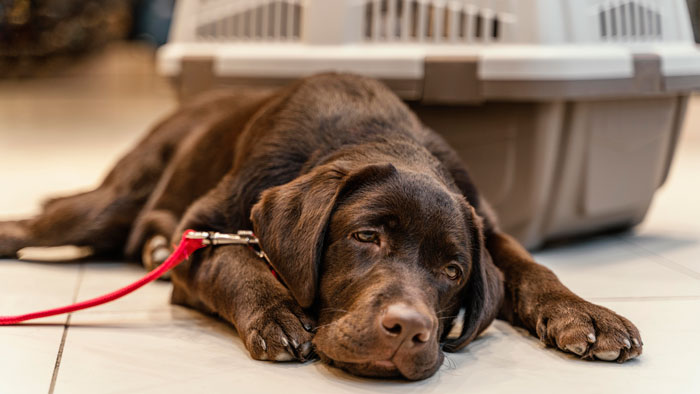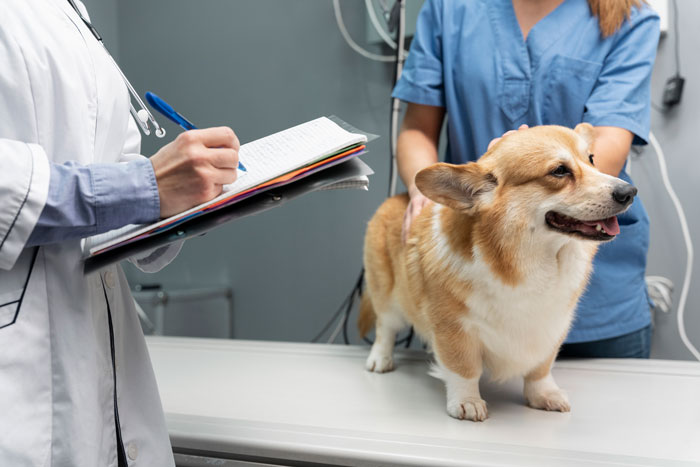Our furry friends can get an upset stomach just like us humans from time to time. Seeing your dog vomiting, having diarrhea, and in pain, is upsetting so we’ve created an article to help pet parents know what to do and how best to care for their poor pet.
Although it is hard to see, it’s important not to panic so that you can get your pet the help they need as fast as possible.
- Vomiting and diarrhea in dogs may indicate issues beyond the gut.
- Pain and bloated tummy in dogs can be serious; vet visit advised.
- Foreign objects, poisons, or parasites can upset a dog's stomach.
- Gradual diet changes and bland food can help an upset dog stomach.
Disclaimer: Please refer to the information in this article as a guide only. If you think that your dog may be suffering from gastrointestinal problems, it’s best to take them to your veterinarian for proper diagnosis and treatment.
The information provided herein is for informational purposes only. Please refer to our disclaimer for more details..
How do I know if my dog has an upset stomach?
Our pets can tell us that they are having tummy trouble in a variety of ways, which we’ll explain in this section as we talk through some upset stomach symptoms.
Vomiting
Vomiting is a common symptom of an upset stomach, caused by a variety of problems. It’s good for pet parents to know, that vomiting isn’t necessarily specific to gastrointestinal system problems. Sometimes dogs with problems elsewhere in the body may vomit, for example, if they are in severe pain or suffering from serious conditions such as septicemia.
If your pet’s diarrhea contains blood, it’s important to take them to your veterinarian immediately.
Diarrhea
Again, diarrhea is a common symptom of an upset stomach, however, can also be a symptom associated with other non-gastrointestinal tract conditions.
If your pet’s diarrhea contains blood, it’s important to take them to your vet immediately.
Pain
If your furry friend keeps looking at their tummy, or can’t seem to get comfortable, it could be that their stomach is causing them pain.
If your dog is showing signs of pain, and their tummy seems to be bloated or enlarged, it’s best to take them to your veterinarian as soon as possible, especially if they are a large breed. Pain and a bloated tummy can be signs of a serious condition called gastric dilation and volvus. If you suspect your dog has GDV, it’s important to take them to your veterinarian immediately.
Vocalization
Vocalization (whining, whimpering, or ‘crying’), can be your pet’s way of telling you that they are in pain and need your help.
Decreased appetite
Just like us humans, when our furry friends have a poorly tummy, they often go off their food. If your pet usually enjoys their food, and suddenly seems uninterested for more than a couple of days, it’s best to take them to your vet to get them checked.
Lethargy
Vets use the word ‘lethargy’ to refer to animals that have less energy or being really tired. If your pet has an upset stomach and is feeling under the weather, then they may be less active. Additionally, vomiting and diarrhea can cause pets to feel weak and have less energy
What are some causes of an upset stomach in dogs?
Dogs can have stomach issues for a variety of reasons, some of which are more serious than others. In this section, we’ll briefly explain some common causes of upset stomach in dogs.
It’s also good for pet parents to remember, that an upset stomach doesn’t necessarily mean that a sick dog has a problem with their digestive system, as many of the symptoms of an upset stomach are what vets call ‘non-specific’. This means that they are not specific to one disease or condition.
Foreign body
Vets use the term ‘foreign body’ to describe anything inside which should not be there. When it comes to your dog’s digestive system, this could mean swallowing toys, rubbish, or material stuck in the mouth.
Objects or items that have been swallowed, can upset your pet’s digestive system by damaging it or even getting stuck. If your pet suspects that your dog may have swallowed something they shouldn’t,m they will most likely perform an x-ray, this will help them to spot if something is inside.
If you suspect that your pet may have eaten or swallowed something harmful, it’s important to take them to a veterinarian immediately.
Infectious disease
Infectious agents such as bacteria and viruses can upset a dog’s stomach, by a variety of different mechanisms. Often a dog can come into contact with them through their environment. To help your dog and reduce the chances of them becoming sick, it’s a good idea to vaccinate them as there are some vaccinations available for conditions affecting the gastrointestinal system.
Poisoning
If your pet eats or comes into contact with a toxic substance, it can in some cases give a dog an upset stomach. Some substances, plants or food items are more dangerous for dogs than others, so if you think your dog has eaten something they shouldn’t it’s best to call your veterinarian straight away if you think your dog may have come into contact with something they shouldn’t.
The Pet Poison Helpline offers a 24/7 service for pet parents whose animals may have been affected by something harmful. Additionally, they have a useful search page where you can read about harmful substances for pets.
Parasites
Some types of internal parasites can contribute to or cause an upset stomach in dogs. To help care for your dog and protect them from parasites veterinarians recommend treating your dog for both endo and ectoparasites.
Internal organ problems
As we mentioned earlier, digestive upset can be secondary to primary problems elsewhere in your dog’s body. Dogs with existing health conditions, senior dogs, or immunocompromised dogs should be taken to a veterinarian if an upset stomach is suspected.
Gastric ulcers
Sadly, dogs can suffer from gastric ulcers just like us humans. Stomach ulcers and their initial stages can cause stomach pain in pets and need to be treated by a veterinarian.
Diet change
If you’ve recently given your dog a new food or changed something in their diet you may notice your dog has an upset stomach. When giving new dog food or changing their diet, it’s best to do it slowly and gradually. Many dogs don’t react well to abrupt changes in their diet and can get stomach aches or upset as a result.
If you think this may be the case, to help your dog recover, gradually mix the new food into their original one before giving it to your dog.
Dog with an upset stomach: what to do
When our furry friends are unwell, it’s normal for our pet parents to be worried and distressed. Amidst the panic, it can be difficult to know what to do, so in this section we’ll explain some things pet parents can do to help their four-legged friends.
Before we start, we’d like to emphasize, that if you notice any of the following symptoms in your pet, it’s important to take them to your veterinarian immediately (if you can, it’s a good idea to call them beforehand to let them know you’re coming).
Home remedies for stomach problems in dogs
As we mentioned earlier, if your dog has stomach problems, with mild symptoms which don’t resolve after a day, you’ll need to take them to your veterinarian.
However, if your pet has just been sick once, or had a couple of bouts of diarrhea, you might want to try the following after consulting with your veterinarian:
- Let them go outside – letting your pet have some gentle exercise outside (eg a very short walk outside or being let into the garden), can help them to get things moving, and may have them feel better, especially if they need to be sick, or remove excess grass or feces.
- Allow them to rest – if your pet isn’t feeling 100%, it’s best to leave them in a calm and quiet area, away from other pets or family members.
- Give them a bland diet – White rice and boiled chicken, can be a good meal for four-legged friends with an upset tummy. This is because it can be more gentle and easy to digest compared to normal pet food. This can also help encourage dogs with reduced appetites to eat.
Dogs with a weak immune system, young dogs, or senior dogs might need additional nutrition to soothe their upset stomach and help get back to normal so it’s best to contact your vet.
If your dog doesn’t get back to normal after a few days, or you can’t get your dog to eat, take them to your vet.
Conclusion
We hope you’ve enjoyed reading this article about stomach upset in dogs and getting your dog back to normal. Don’t forget, if your pet is sick or has diarrhea more than a couple of times, it’s best to take them to your vet for a proper diagnosis and treatment.
190views
Share on Facebook
 Dark Mode
Dark Mode 

 No fees, cancel anytime
No fees, cancel anytime 



 Image credits:
Image credits:  Image credits:
Image credits: 










































-3
0